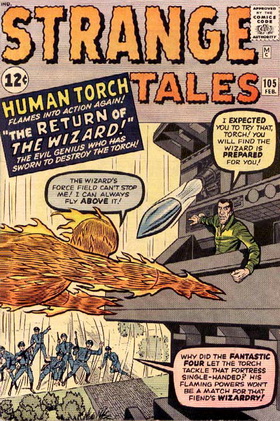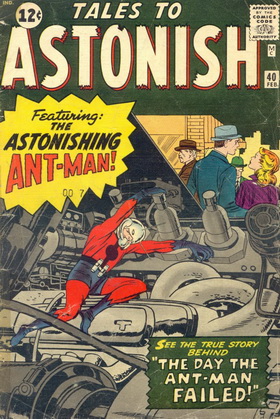
Published: March, 1963
Script: Stan Lee
Art: Steve Ditko
Letters: Art Simek
Russ tells me this is the last issue of The Incredible Hulk…at least for a while.
Bit of history: Back in the 1960’s, Marvel’s distributor only allowed them to publish a certain number of comics, and since they were planning to introduce a new title (more on that soon!), as the song says, “Somewhere someway, somehow, somethin’s gotta give.” This was strictly a Darwinian case of Survival of the Fittest, and Hulk simply didn’t make the cut.
Not to worry, though! Of course we’ll see him again, making guest appearances in other titles, and eventually he’ll share Tales to Astonish with Giant-Man. And a little while after that, that title will morph back into The Incredible Hulk. But this is the last full-blown Hulk adventure of the initial run.
No need to spend a lot of time rehashing the action. Suffice it to say the alien menace Metal Master wreaks havoc on earth, and though Hulk is at first victim to his superpowers, in the end a combination of Hulk’s super-strength and Banner’s super-intellect defeats the Metal Master, and order is restored on Earth. Standard comic book fare.
What I’d like to take a few moments to ponder, though, is some of the other stuff happening alongside the main storyline. Because some of this other stuff helps explain why Hulk was “let go” from his stint as a title-carrying superhero. The Hulk mythos has been plagued with inconsistencies, and this final story brings it all to a boiling point.
Now, before I start ragging on Hulk, let me preface my remarks by acknowledging that I’m no expert on any of this. I wasn’t even around when this comic was originally published—well, actually I was, but at the time I was too busy playing with Barbies to even know there was such a thing as a Hulk. So everything I say from this point on must begin with “It seems to me…”
It seems to me—and I’ve said this from the beginning—that Hulk’s creators have no idea what to do with him. He’s supposed to be a super-HERO, but in so many ways he comes off as a villain. He’s ugly, rude and completely misunderstood. He has no desire to do good, only to protect himself. On rare occasions he’ll manage a good deed—like that time he rescued a family from a burning building—but of course, he gets no thanks for his efforts, only shrieks of horror and dismay, and further pursuit by the military. How many times can we watch Hulk evade the military? When self-preservation is the “superhero’s” only motivation, the story gets old fast.
However, Hulk may have one redeeming quality: he’s beginning to show concern for his young sidekick, Rick Jones. Despite the fact that Hulk often calls his only friend in the world a “Brat,” when push comes to shove, he’ll do what’s needed to keep the kid safe.
Nice. But is it enough to power a superhero?
In the first issue of The Incredible Hulk, Banner transforms to Hulk when the sun sets. Next, Banner develops a machine that accomplishes the transformation with the flip of a switch. We’ve just gone from bad to worse! The inherent drama in a creature like Hulk is that you never know when he’s going to appear and go berserk. Remember Bill Bixby warning, “Don’t make me angry. You wouldn’t like me when I’m angry,” right before his eyes go glassy and big green Lou Ferrigno shows up? That, at least, provided some honest-to-goodness drama! But pushing a button has no business in a dramatic narrative about an oversized monster!
Stan must have realized this, and so now, perhaps as a last ditch effort, is trying a few new twists. At one point, when Banner puts himself under the influence of the machine, his body becomes the Hulk, but his head is still Banner! (Weird, huh?) Another time, Hulk presses the button, but does not immediately transform back to Banner. What!? Is Banner now doomed to live out his days as the Incredible Hulk?
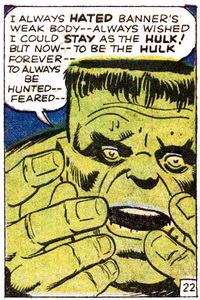 Of course, Banner eventually shows up again. So why did we even bother going through these anomalies? They don’t add anything to the storyline, it just feels like an artificial attempt at conjuring up “drama for drama’s sake.” OMG! What will happen? Well…never mind. It all turns out okay in the end.
Of course, Banner eventually shows up again. So why did we even bother going through these anomalies? They don’t add anything to the storyline, it just feels like an artificial attempt at conjuring up “drama for drama’s sake.” OMG! What will happen? Well…never mind. It all turns out okay in the end.
Sigh…
By this time, Stan must have realized they’d created a monster—but I don’t mean a big green mean machine of a Hulk. Instead, they’ve created this character they’re having a devil of a time making likeable and interesting. How to redeem the Hulk? Does he change at night? Does he change by machine? Is the change immediate? Delayed? Partial? Does he want to help people or hurt people? Is he going to read to us from the classics, or smash some heads? The Hulk we’ve known so far is all over the place, a mess.
Banner is likeable. I like Banner. Hulk—not so much. However, when readers care more about the mild-mannered scientist than the titled “superhero,” something isn’t right.
Admittedly, Hulk is not the archetypal hero. Sometimes it’s exciting to challenge the archetypes and come up with something new and refreshing. And I think eventually we’ll see that with Hulk. But right now, we’re just not there.
And so it seems we’re about to bid adieu—at least a partial and temporary adieu—to big, mean and green, while his creators figure out what the heck to do with the monster they’ve created.
THE RICK JONES DILEMMA
So that’s what’s going on with Hulk. But now we have another issue, the “Rick Jones Dilemma.” Rick Jones was brought in as an assistant for Banner/Hulk, and now that Hulk won’t be around quite as much, you’d think we wouldn’t see much more of Jones, either. There’s really no need to keep the orphaned teenage boy hanging around, right?
But now, the Marvelous Powers-That-Be do something extremely intriguing. Rather than put Rick Jones back on the shelf, they give him something new to do. As I’ve mentioned many times, before meeting Russ, I knew very little about comics, but at some point I know I had heard the phrase “The Teen Brigade.”
In this issue of Hulk, Rick Jones laments, “I’m tired of bein’ just a nothin’! I wanna be where the action is!” When he sees his friends using a ham radio, he has an epiphany and forms the Teen Brigade.
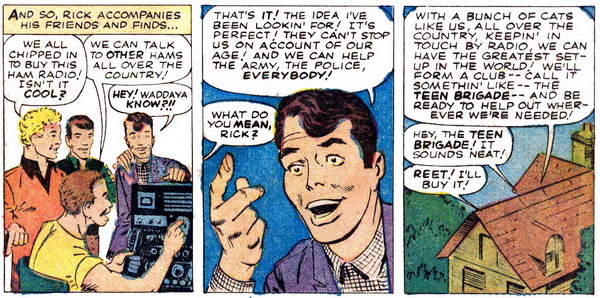
The first order of business for the Teen Brigade is to assist Hulk in creating a “weapon” to defeat the Metal Master. Here’s where Banner’s intellect comes into play, because the weapon Hulk wields against the villain isn’t metal at all, but a cleverly disguised model of plastic and cardboard. The Metal Master becomes so frustrated by his inability to affect this weapon that it appears his own head, rather than the object he’s focusing upon, is about to explode.
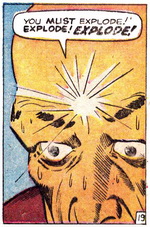 Freaking out, he messes up, lets Hulk get too close, and is bullied into undoing all the damage he’s caused; then, “impelled by an uncontrollable fear of the Incredible Hulk,” the Metal Master is sent packing back to his home planet… “never again to return!” Well, we’ll see about that “never again to return” business, but for the moment, the thankless Hulk has saved the world once again.
Freaking out, he messes up, lets Hulk get too close, and is bullied into undoing all the damage he’s caused; then, “impelled by an uncontrollable fear of the Incredible Hulk,” the Metal Master is sent packing back to his home planet… “never again to return!” Well, we’ll see about that “never again to return” business, but for the moment, the thankless Hulk has saved the world once again.
Of course, he couldn’t have done it without the help of Rick Jones and the Teen Brigade.
Really?
Did we really need a bunch of enthusiastic teenage boys to gather plastic and cardboard from all over the country, in order to pull off this feat? Banner couldn’t have worked this out on his own? I’m being facetious; of course he could have. It seems to me the Teen Brigade is created not so much because the Marvel Universe needs them, but moreso because Stan believes Marvel readers will want them.
Here’s another place where I’m prefacing my remarks with a great big “It seems to me…” because I wasn’t there and I don’t really know, but it seems to me that teenage characters must have provided a huge selling point in comics, or else why would we have them? Batman has Robin, and that’s working out pretty good for DC, so now Marvel gives us Johnny Storm, and Peter Parker, and Rick Jones. Johnny and Pete have a lot of serious work to do, of course, but so far Rick Jones has only served as a helper for Hulk. Yet, even though Hulk is now banished to the land of Guest Appearances, it seems Rick Jones will not accompany him on this journey.
I don’t know what’s coming next for the Teen Brigade, but I’m sure this is not the last time we’ll see this band of teenage boys in ties and hats, hellbent on patriotism and good deeds. “The more the merrier,” I always say, and that might explain the creation of this new Marvel entity to some degree, but…why teenagers? And why Rick Jones?
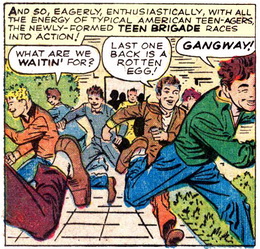 As I understand it, the demographics of the comic buying public at this time is slowly morphing from little boys with a dime and two pennies in their pocket, to young teens, high schoolers, and some college kids. Most comic readers, therefore, either are teenage boys, have recently been teenage boys, or are dreaming of all the wild freedoms they’ll enjoy when they become teenage boys.
As I understand it, the demographics of the comic buying public at this time is slowly morphing from little boys with a dime and two pennies in their pocket, to young teens, high schoolers, and some college kids. Most comic readers, therefore, either are teenage boys, have recently been teenage boys, or are dreaming of all the wild freedoms they’ll enjoy when they become teenage boys.
Teenage boys and comics…a natural combination, sort of like chocolate and peanut butter.
That’s why I think Rick Jones is still going to be around, at least for a while. It seems to me the readers must identify with him and with the other teenage characters, enjoying the fact that mere “kids” like themselves could be instrumental in these “life and death” and sometimes apocalyptic situations.
Look. I may be in my mid-fifties, but amazingly, I haven’t forgotten what it’s like to be a kid. (Come to think of it, reading comics might have something to do with maintaining my strong connection to childhood.) I remember, as a kid, feeling small and insignificant. I remember hearing, way too often, “Children should be seen and not heard.”
Well, here, Marvel Comics is saying—in a sense that I hope nobody will find sacrilegious, because I myself am a Bible-believing Christian—“Suffer not the little children to come unto me.” By the inclusion of young characters like Johnny Storm, Peter Parker, and Rick Jones, Marvel Comics is validating the existence and contributions of young people everywhere. By publishing letters from young readers and taking their suggestions that lead to changes and developments in future storylines, the Marvel creators are proclaiming, “We hear you, and we like what you’re saying,” rather than “Children should be seen and not heard.” (Who came up with that one, anyway?)
Now, to be fair, Marvel Comics is a business, and artistic decisions were no doubt ultimately based upon the bottom line of how much profit in increments of twelve cents could be accumulated. I just find it refreshing that the creators acknowledged their readers had something to offer and made efforts to include them in so many of the creative decisions that ultimately shaped the legacy of Marvel Comics.
PRODUCTION NOTES
And now, I have only one more thing to say: In this final issue of the initial run of The Incredible Hulk, the art is by Steve Ditko, rather than Jack Kirby, who illustrated all the previous issues of Hulk. It might just be a case of preferring the familiar, but I’m not exactly fond of Steve Ditko’s representations of most of the characters. Hulk looks pretty creepy, and that’s fine, but where is the Bruce Banner and Rick Jones we’ve come to know and love? And why does Rick have that funny little curl in the middle of his forehead? Was that really necessary?
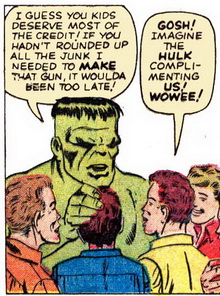 After going on and on about how great it is that the creators choose to include teenage characters, I have to mention that a lot of the time, they’re portrayed pretty dorkily. I know “dorkily” is not a word, but it’s the best description I can think of.
After going on and on about how great it is that the creators choose to include teenage characters, I have to mention that a lot of the time, they’re portrayed pretty dorkily. I know “dorkily” is not a word, but it’s the best description I can think of.
Steve Ditko does this. So does Jack Kirby. It’s probably more a sign of the times than of any particular illustrator’s artistic abilities. From a 2012 perspective, it’s almost charming, and makes us chuckle. I haven’t looked at many current comics, but I feel fairly certain that no teenage boys are wearing ties and hats, unless they’re attending church or high school graduation.
![]() Join me in a fortnight, when Don Blake gets a swollen head, and I contemplate Occam’s Razor and the retirement benefits on the Planet Xarta! All of that and more, next time, in The Marvelous Zone!
Join me in a fortnight, when Don Blake gets a swollen head, and I contemplate Occam’s Razor and the retirement benefits on the Planet Xarta! All of that and more, next time, in The Marvelous Zone!
| Want to read this comic on your computer? Marvel has a scan! Want to own this story? Buy the Masterworks! |

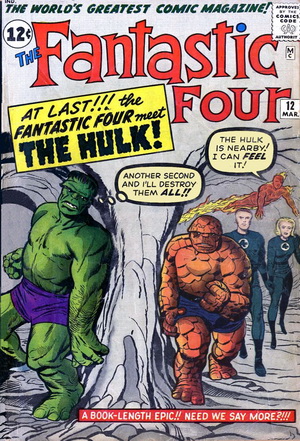
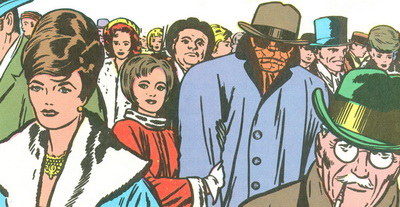 So they weren’t likely to meet at the grocery store, Starbucks, or during an evening’s entertainment at the symphony.
So they weren’t likely to meet at the grocery store, Starbucks, or during an evening’s entertainment at the symphony. 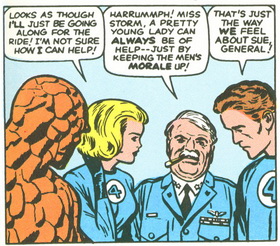 Yet, in typical 1960’s fashion, Sue is consoled (or is it…patronized?) with the statement that a pretty young lady can always be of help just by keeping up the men’s morale.
Yet, in typical 1960’s fashion, Sue is consoled (or is it…patronized?) with the statement that a pretty young lady can always be of help just by keeping up the men’s morale.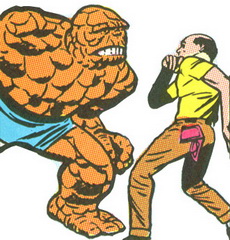 Rick Jones finds the wallet and quickly discovers that Kort is actually a card-carrying member of the Communist Party. Literally. Kort was carrying his Communist Party Membership Card in his wallet. On a US military base. In his wallet. In his pants pocket. Really.
Rick Jones finds the wallet and quickly discovers that Kort is actually a card-carrying member of the Communist Party. Literally. Kort was carrying his Communist Party Membership Card in his wallet. On a US military base. In his wallet. In his pants pocket. Really.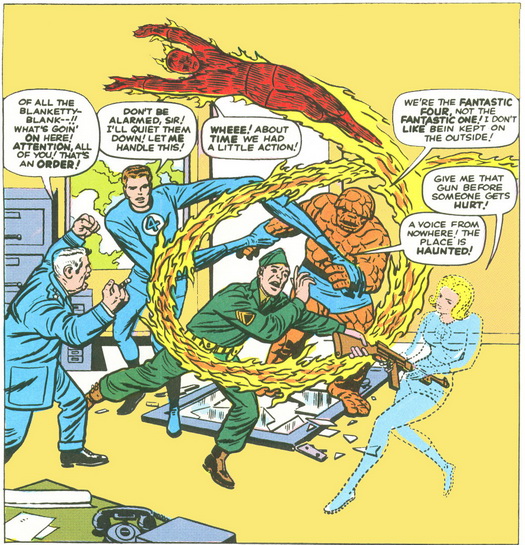
 But Commie Karl Kort is not really “assisting” Banner at all. Oh no! Instead, he is secretly working to sabotage Banner’s work. Kort is even smart enough to make General Ross think it’s Hulk behind everything that’s gone wrong. Well, maybe you don’t actually have to be a brainaic to do that. For one thing, Hulk is an easy target. Anything goes wrong anywhere…must be the Hulk. I mean, just look at him! And secondly, Ross is predisposed to blame Hulk for everything that’s wrong with the world, from destroyed missile installations to the seeds in his watermelon. You could tell Ross that Hulk is responsible for global warming and he would bellow, “There’s no such blankety-blank thing as global warming! And the Hulk is causing it!”
But Commie Karl Kort is not really “assisting” Banner at all. Oh no! Instead, he is secretly working to sabotage Banner’s work. Kort is even smart enough to make General Ross think it’s Hulk behind everything that’s gone wrong. Well, maybe you don’t actually have to be a brainaic to do that. For one thing, Hulk is an easy target. Anything goes wrong anywhere…must be the Hulk. I mean, just look at him! And secondly, Ross is predisposed to blame Hulk for everything that’s wrong with the world, from destroyed missile installations to the seeds in his watermelon. You could tell Ross that Hulk is responsible for global warming and he would bellow, “There’s no such blankety-blank thing as global warming! And the Hulk is causing it!” bring down the incredible Hulk, but you have to wonder what might happen if Hulk and Thing get into it. Well, wonder no more!
bring down the incredible Hulk, but you have to wonder what might happen if Hulk and Thing get into it. Well, wonder no more! 
 without even one shred of supporting evidence. What school of journalism did Jameson attend? Does he not know the difference between “fact” and “opinion”? Does he not know…or does he simply not care? Or maybe he just hopes his readers don’t know and don’t care.
without even one shred of supporting evidence. What school of journalism did Jameson attend? Does he not know the difference between “fact” and “opinion”? Does he not know…or does he simply not care? Or maybe he just hopes his readers don’t know and don’t care.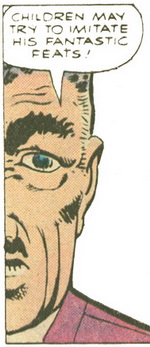 1. Power corrupts, absolute power corrupts absolutely. As the publisher of the powerful Daily Bugle, Jameson is drunk with power. Realizing that he is in a position to go way beyond simply reporting the news, that he can shape public opinion, he exercises that power every chance he gets, whether it’s right or not, whether it makes sense or not. He wields his power, simply because he can, simply because he enjoys being powerful.
1. Power corrupts, absolute power corrupts absolutely. As the publisher of the powerful Daily Bugle, Jameson is drunk with power. Realizing that he is in a position to go way beyond simply reporting the news, that he can shape public opinion, he exercises that power every chance he gets, whether it’s right or not, whether it makes sense or not. He wields his power, simply because he can, simply because he enjoys being powerful. Spider-Man, causing the poor kid no end of trouble. We don’t know enough about Jameson yet to know his true motives. I’m sure in future stories we’ll get a clearer picture of just what he’s up to, what makes him tick. But for the moment, I guess I’ll have to give him the benefit of the doubt—innocent until proven guilty. That is, of course, a lot more than Jameson is giving Spider-Man at this point! But then, I have a unique perspective on Spider-Man which J. Jonah Jameson does not enjoy.
Spider-Man, causing the poor kid no end of trouble. We don’t know enough about Jameson yet to know his true motives. I’m sure in future stories we’ll get a clearer picture of just what he’s up to, what makes him tick. But for the moment, I guess I’ll have to give him the benefit of the doubt—innocent until proven guilty. That is, of course, a lot more than Jameson is giving Spider-Man at this point! But then, I have a unique perspective on Spider-Man which J. Jonah Jameson does not enjoy. 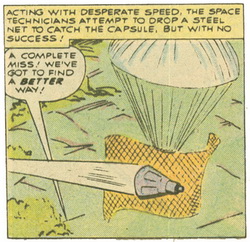 • There’s a cute bit where Spider-Man gets paid for his show by check, but of course he can’t cash the check because he doesn’t have a social security card or a bank account in the name of “Spider-Man”! Having a secret identity can be a bummer, causing all kinds of logistical problems. I don’t think the FF ever had to deal with this!
• There’s a cute bit where Spider-Man gets paid for his show by check, but of course he can’t cash the check because he doesn’t have a social security card or a bank account in the name of “Spider-Man”! Having a secret identity can be a bummer, causing all kinds of logistical problems. I don’t think the FF ever had to deal with this! Peter Parker decides he can make money by joining the Fantastic Four, so he breaks into FF HQ, but the Four are not impressed with his antics. Spidey goes away mad.
Peter Parker decides he can make money by joining the Fantastic Four, so he breaks into FF HQ, but the Four are not impressed with his antics. Spidey goes away mad. impressed (in fact, “twice as impressed”) with his ability to break into their headquarters, they will have no choice but to grant him membership in their exclusive club.
impressed (in fact, “twice as impressed”) with his ability to break into their headquarters, they will have no choice but to grant him membership in their exclusive club. 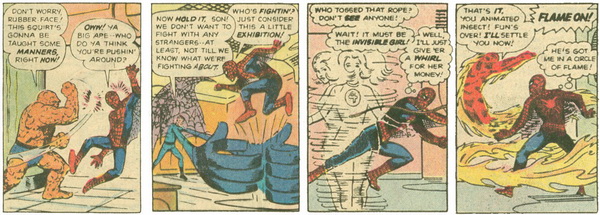
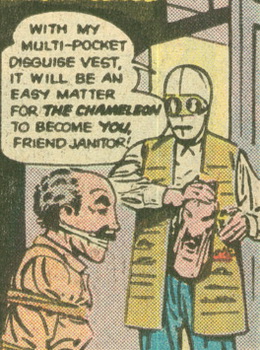 One: He wears a vest of many pockets, in which he stores items that allow him to assume a multitude of disguises. Now, disguising yourself is not a super-power; however, concealing all that stuff within the pockets of a single vest? You’ve got to admit, that’s pretty amazing. The Chameleon himself may not have super-powers, but does his vest? The Puppet-Master sculpted realistic figures, but his medium was a radioactive clay with supernatural qualities. Dare I say…magical? Is that what’s going on with the Chameleon’s vest? Is it magical? If deprived of his vest, could the Chameleon still wreak havoc?
One: He wears a vest of many pockets, in which he stores items that allow him to assume a multitude of disguises. Now, disguising yourself is not a super-power; however, concealing all that stuff within the pockets of a single vest? You’ve got to admit, that’s pretty amazing. The Chameleon himself may not have super-powers, but does his vest? The Puppet-Master sculpted realistic figures, but his medium was a radioactive clay with supernatural qualities. Dare I say…magical? Is that what’s going on with the Chameleon’s vest? Is it magical? If deprived of his vest, could the Chameleon still wreak havoc?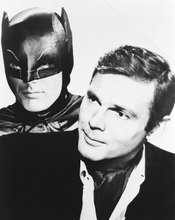 Next: There’s no way for him to earn a legitimate living? Does the Chameleon not realize that when Spider-Man takes off his outfit, he’s a normal human being? And does he not even consider the possibility that the person under that suit might have other ways of earning a decent living? I mean, what if the person under that suit is Bruce Wayne?
Next: There’s no way for him to earn a legitimate living? Does the Chameleon not realize that when Spider-Man takes off his outfit, he’s a normal human being? And does he not even consider the possibility that the person under that suit might have other ways of earning a decent living? I mean, what if the person under that suit is Bruce Wayne? Okay. Is this is the equivalent of showing all your cards before you place your bet? Up till now, the only thing the cops knew was that Spider-Man claimed someone had “impersonated” him. They also heard him say, “Nobody’s framin’ me for anything!” But Spider-Man’s name has been smeared in the press, his reputation tarnished by the fanatical rantings of J. Jonah Jameson. The cops would be likely to discredit anything Spider-Man says. And the cherry on top: at this point, there is no actual proof of any imposter.
Okay. Is this is the equivalent of showing all your cards before you place your bet? Up till now, the only thing the cops knew was that Spider-Man claimed someone had “impersonated” him. They also heard him say, “Nobody’s framin’ me for anything!” But Spider-Man’s name has been smeared in the press, his reputation tarnished by the fanatical rantings of J. Jonah Jameson. The cops would be likely to discredit anything Spider-Man says. And the cherry on top: at this point, there is no actual proof of any imposter.  However, this story does one thing very well: it moves along the plight of poor Peter Parker, the much-maligned and misunderstood hero. In the previous story, Jameson publically discredits Spider-Man, and here the Chameleon incorporates that public disgracing into his evil schemes by using Spider-Man as the “fall guy.” Elements build on elements, the plot thickens, the web expands.
However, this story does one thing very well: it moves along the plight of poor Peter Parker, the much-maligned and misunderstood hero. In the previous story, Jameson publically discredits Spider-Man, and here the Chameleon incorporates that public disgracing into his evil schemes by using Spider-Man as the “fall guy.” Elements build on elements, the plot thickens, the web expands. 